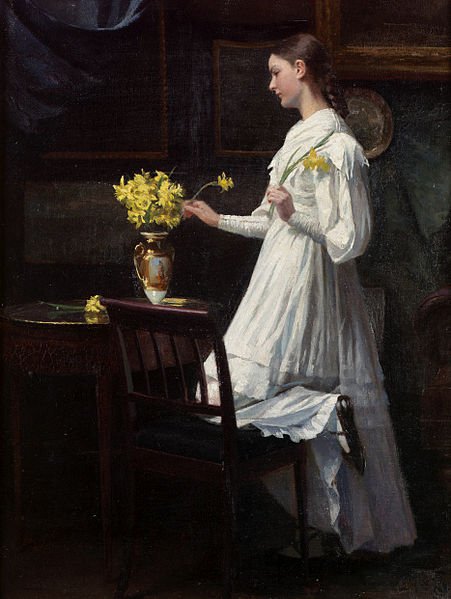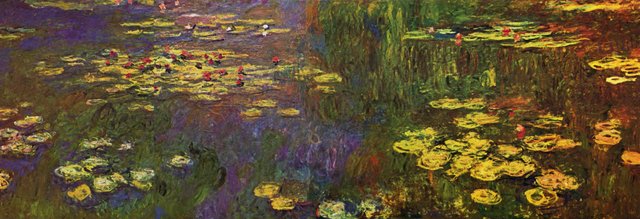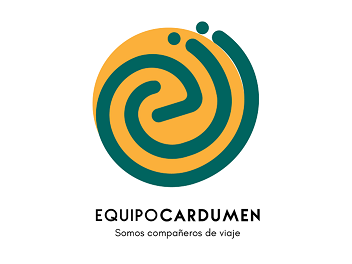A Toy and Flower Sonnet (Petrarchan)
Hi, poetry lovers.
It's been a while since I didn't post a poem, although I've been writing some (which never seem OK to me).
As you may know, a Petrarchan sonnet contains one octave and one sestet (or two tercets) for a total of fourteen lines. It follows a rhyme scheme ABBABBA CDECDE, and its rhythm is iambic pentameter (five metrical feet which sound ta-TA); you may want to have this in mind so you can have a pleasant reading, and better if you read it aloud—if you ask me. This is the structure I felt like trying for my poem. Below the piece, you can see why (if you are interested).

Arranging Daffodils by Carl Christian Frederik Jacob Thomsen, 1894
A Toy and Flower Sonnet
The poet speaks of roses, lilies gay,
bright daffodils and multicolor beds,
like rainbows all their hues of light had bled,
good natured sweets which glad adorn his day.
Simply and pale the trough of thought will stay,
the blacks and whites picked in the bucket fed
with dull remains all gray as if stone dead,
imaginations withered in their play.
I wish I could erase all blissful verses,
so I could be the first to bring these joys.
My selfishness is shy and hypothetic;
fear not the envy that my tongue rehearses,
for ingenuities make finest toys,
which make delusion seem quite less pathetic.

Water Liliesby Oscar-Claude Monet, n.d.
About the Form and Meaning of This Poem
Sonnets are almost eight hundred years old and poets have been creative in their arrangement. I have chosen the Petrarchan form to compose “A Toy and Flower Sonnet” because of two reasons: I liked the sound better, given the words I wanted to use; and I definitely needed the typical structure of argument, plus volta, plus solution in order for readers to appreciate the irony of the conclusion which does not solve the problem.
Traditionally, a Petrachan sonnet presents the reader with a problem, proposition or question in the octave; then it adds a volta (the turn) towards the ninth line to provide a change of tone and signal the coming of the solution or answer. The pause that we make between the octave and the sestet welcomes the change introduced by the volta, and so the reader can guess a relationship must be established between the two stanzas in order for them to get the meaning of the poem: an argument has been stated.
“Toy and Flower Sonnet” speaks of the poets’ struggle as they pursue a drop of originality to add in their compositions. In the end, they feel their job would be easier had poetry ever been less prolific.
Thanks for reading.
Posted from my blog with SteemPress : https://marlyncabrera.timeets.com/2018/10/16/a-toy-and-flower-sonnet-petrarchan/
Soy compañera de viaje en

Logo diseñado por @octocel
Y miembro de @talentclub.

En @EquipoCardumen te invitamos a seguir de cerca el trabajo de @talentclub, @helpie, @reveur y @bebeth, comunidades que trabajan duro por llevar adelante la plataforma.

A beautiful sonnet about any artist's scariest nightmare: the loss of the inspiring muse, of originality, of the magic touch that would give their work the recognition and distinction over the crowd.
In your case, it is obvious that as time passes your quill gets sharper, your brush stroke more skillful, and your vision more expansive (and it's been certified now!).
The metaphor of the flowers, the colors and the toys, is more than appropriate since they represent the paradox of finite elements that are meant to produce infinite joy and entertainment.
Like the flowers that withered when cut and put in vases, the poet's imagination can also fade and paint a sad spectacle.
Like a toy, the poetic art can also become boring, stale, predictive.
Constant renovation is necessary, then to keep the vivacity of colors, flowers and toys. In poetry, it becomes necessary, I guess, to avoid being cut off and bottled. The contact with verse-nurturing earth should allow the artist a guarantee of infinite flowers that, even if of the same hues, can pop up in creative new ways, impressing and perfuming those willing to let their days be adorned.
Un hermoso soneto sobre la pesadilla de todo artista: la pérdida de la musa, de la originalidad, del toque mágico que le dé a su obra el reconocimiento y la distinción por encima de la multitud.
En tu caso, se evidencia que con el paso dl tiempo tu pluma se vuelve más afinada, tu pincelada más sutil y tu visión más amplia.
La metáfora de las flores, los colores y los juguetes es más que apropiada, pues representan la paradoja de elementos finitos que crean belleza y entretenimiento infinitos.
Como las flores que se marchitan una vez cortadas y puestas en floreros, la imaginación de la artista también puede opacarse, pintando un triste espectáculo.
Como un juguete, el arte poético también puede volverse aburrido, anticuado, predecible.
La renovación constante es necesaria, entonces para mantener la vivacidad de colores, flores y juguetes. En la poesía, se hace necesario, supongo, evitar el corte y envasado. El contacto con la tierra que nutre los versos ha de permitirle a la artista garantizar infinitas flores que aunque tuvieran los mismos colores, puedan seguir apareciendo de formas inesperadas, impresionando y perfumando a aquellos dispuestos a dejarse adornar el día.
Este comentario es un post, @hlezama :D Ver todo el significado que exprimiste de este poema me emociona mucho.
Las flores y los juguetes... Había comenzado a escribir un cuento y luego recordé esos días del reto de 100 Días de poesía de @d-pend y me dije a mí misma, "ah, ¿por qué no? ¡Me provoca escribir un poema!" Y cuando me da por ponerme poética, me da por los sonetos; para mí es como esculpir piedra: sabes lo que quieres lograr, le das forma, cincelas, lijas, acaricias, pules, admiras, dudas, hasta que dices "¡Ya está!" Y con algo de suerte, alguien lo leerá y tal vez hasta lo disfrute.
Gracias a la iniciativa genial de @d-pend y a su generosidad y la de los compañeros del reto aprendí a soltar las palabras y a ver con otros ojos la escritura de la poesía.
Este soneto refleja lo que pienso (y siento) con respecto a este tema. Y justo ahora quisiera estar menos cansada, para poder salir a comentar varias piezas por allí; espero poder hacerlo el domingo.
¡Un abrazo!
Aunque me imagino que en la traducción se perdió algo, me gustó el sentido de la escritura poética escondido en estos versos, @marlyncabrera!! Aunque no está tan escondido ahora, ya que tú, amablemente, lo revelaste!! Abrazos
Gracias, @nancybriti ☻♥ Si me ponía a traducir se me pasaba la hora, pero siempre traduzco en algún momento; creo que tales traducciones abren una diálogo y una crítica interesantes. ¡Abrazos para ti! ♥
Hi marlyncabrera,
Visit curiesteem.com or join the Curie Discord community to learn more.
Thanks,@curie. It means a lot to me that you've chosen this sonnet. Your team is doing a great job to motivate us to produce original content on Steemit :)
This post has been selected for curation by @sunravelme. It has been upvoted and will be featured in this week's Working Title post. It will also be considered for the official @minnowsupport curation post and if selected will be resteemed from the main account. Feel free to join us on Discord!
Thanks a lot, @msp-curation and @sunravelme :) It feels so good you have valued my sonnet; makes me happy.
A great team doing a great job on Steemit.
Hi @marlyncabrera thank you for sharing this poetry "A Toy and Flower Sonnet" . I love poetry and was always impressed by those who could find the rhyme that was a real struggle for me. At home when we were little we also tried to write little poems and I was really unsuccessful, my sister always won it. I am just hopeless but I love to read and really enjoy poems. It is something new I learnt today about Petrarchan sonet, I have never thought that it is the way how the sonet formed and that it divides the poem's 14 lines into two parts, the first part being an octave and the second being a sestet. Thank you for such a learning point :)
Hi, @stef1. It makes me happy that you've liked this sonnet, and that you've found the information useful. I'd like to read one of those poems you and your sister wrote; who knows, maybe you find inspiration and discover rhyming is not that difficult now that you are an adult.
Muses are mischievous sometimes.
Thanks for the visit, and please, let me know if you ever try writin poetry again :D
Thank you that is really nice of you, next time I chat to my sister I will tell her about you, she might have a laugh as it was some times ago when we were competing in attempting to write. But do not you think that this is something you born with it, like can or you can't?
We know for a fact that talent has an innate element, and that education can enhance it. Sometimes talents sleep long time before we wake them up :D
Hi marlyncabrera,
This post was nominated by a @curie curator to be featured in an upcoming Author Showcase that will be posted Late Saturday/Early Sunday (U.S. time) on the @curie blog.
NOTE: If you would NOT want us to feature your post in the Author Showcase please reply, email, or DM me on Discord as soon as possible. Any photos or quoted text from your post that we feature will be properly attributed to you as the author.
You can check out our previous Author Showcase to get an idea of what we are doing with these posts.
Thanks for your time and for creating great content.
Akpan (@curie curator)
[email protected]
Hi, @misterakpan. I'd be honored to appear in this Author Showcase. I hope I'm not replying too late.
Statement:
I've on Steemit since January and started out as a member of @EquipoCardumen, where we're trying to thrive on Steemit. I started writing poetry here thanks to my dear Steemit-friend @d-pend, who has been really supportive. Then I joined @TalentClub, where you feel motivated to do your best.
I love reading and writing sonnets, and it's been a pleasure you have noted this one. I really appreciate it.
THANKS.
This is a beautiful poem. I am sorry but I have to ask.. have you studied literature or poetry? Your writing doesn't seem to be a writing of a hobby writer. It looks so professional. It's very pleasant and easy to read and your choice of words is perfect. And you also know details about sonnets that are usually not commonly known.
I really enjoyed it. Thank you for sharing!
Hi, @delishtreats. First of all, I'm truly flattered.
It turns out I did study literature formally, and I've been trying to create poetry and stories since I learned to write. But only a few pieces have been lucky to find their way to the public eye and fewer, to be liked. So I really appreciate you have liked this one and that you have taken time to write such an encouraging and thoughtful reply :D
Much appreciated. Do you write poetry; I'll go check your profile. Thank you so much. You've made my day!
I knew it! There is simply something about your poetry that feels like you studied it..
No, no, I don't write poetry :) My posts are about travel and veganism..
Have a great start of the week!
Wow. Este soneto es sencillamente precioso! Puedo ver en los comentarios que estudiaste literatura formalmente, y cuando leo este tipo de trabajos me gustaría hacerlo así también.
Muchos poetas de verso libre (tu servidor incluido) suelen desdeñar la forma y decir que eso es solo una superficialidad, y que mientras el contenido sea bueno y sincero poco importa la rima, la métrica, y esas otras cosas que ignoro. Aunque en mi opinión es verdad que el fondo precede a la forma, pienso que la "verdadera poesía" (lo que eso signifique) cristaliza ambas y transmite forma en su fondo y fondo en su forma. Creo que este poema lo logra de manera sublime.
En mi ignorancia, escribo versos libres lo que más. Me siento frente a la hoja cuando un poema me pide salir, y le permito hacerlo sin detenerme tomar otras consideraciones. Pero el hace un tiempo descubrí lo que era una décima y me enamoré de su ritmo, así que me propuse a escribir una, y disfruté muchísimo del proceso y el resultado.
Tu post me ha inspirado a publicarla : ) Gracias por compartir tu arte y tu experiencia!
Hola, @amirani. Muchas gracias por tu comentario tan completo ♥
Sabes, creo que el verso libre es mucho más difícil de escribir que un soneto; considero que es un reto no hacerlo tan largo, por ejemplo, poder completar el efecto de la manera más eficiente sin desperdiciar las palabras. Admiro a quienes pueden lograr eso. Creo que hay una trampa en formas como la del soneto: ciertamente es difícil la elección de vocabulario, ajustarse al esquema, etc... y en particular el soneto tiene la dificultad extra de tener que exponer un argumento y además todo debe sonar hermoso... Todo esto es cierto, pero alguien ya ha dejado la fórmula para que la sigamos. Si nos ajustamos bien a esa fórmula, ya está resuelto. En cambio el verso libre toma tiempo; el poeta debe ver si la forma lo complace, si se combina en armonía con el contenido y ambos se complementan.
Cuando escribimos un soneto, solemos saber qué tenemos que mejorar aún; ubicar el problema es sencillo porque basta con compararlo con la estructura que debería ser. Sin embargo, cuando escribimos verso libre, no hay normas que seguir así que no hay un patrón para comparar y decir, "Ah, esta rima está mal, o aquí falta una sílaba, o la proposición no se entiende..."
He pasado por tu blog y he visto que es muy bueno. Cuando recupere la cordura después de separarme unas horas de mi laptop, pasaré a dejar saludos y algún comentario sobre tu poesía ☻
Thank you, Maryln, for both an intriguing and delightful sonnet, and also such a fine description of the Petrarchan form.
I shall be thinking about this form and considering whether to use it in my next sonnet. :D
😄😇😄

That'd be great, @creatr ☻ There are variations in all sonnet forms; I should pick one next time. Thanks for your appreciation and for writing amazing poetry. I've just visited your library ;)
I would find any article you might care to write about alternative sonnet forms to be interesting, enlightening, and educational. I'm not always very "alert" to what's happening here on Steemit, and so--in the event that you do explain any other forms--I would consider it a great personal favor were you to leave me a note about it? I would not want to miss that.
Thank you so much for taking the time to visit my library, and for your great encouragement today. :D
Sure thing, my new Steemit-friend ☻ I'll let you know! And thanks for you kindness ♥